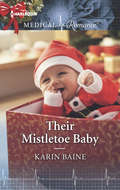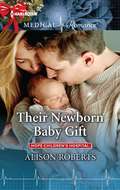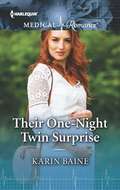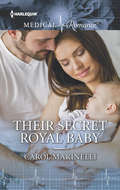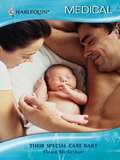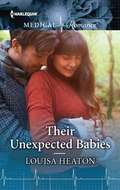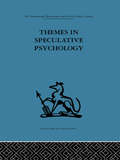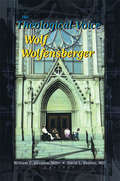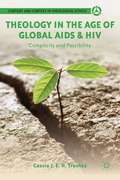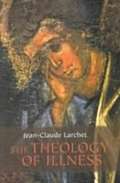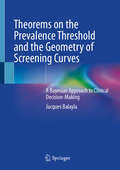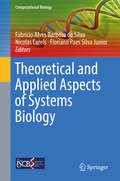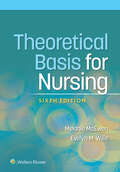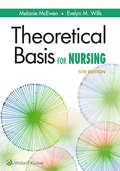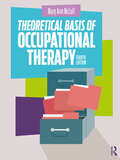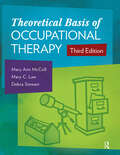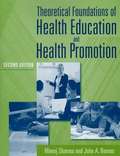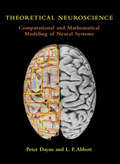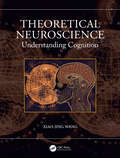- Table View
- List View
Their Miracle Child: A Delightful Medical Romance (Medical Romances #21)
by Gill SandersonAnother heartwarming medical romance from best-selling author Gill Sanderson! Perfect for fans of Mia Faye, Laura Scott, Helen Scott Taylor, Grey's Anatomy and ER.Readers LOVE Gill's gripping medical romances!'Remarkable writer!!' 5* author review 'A truly wonderful writer' 5* author review 'I find all of Gill Sanderson's books very readable and enjoy the escapism they give me' 5* author review'A truly gifted writer with an enormous amount of talent and sensitivity' 5* author Four years before, after the sudden death of her newborn child, Alana Ward had left her husband, Dr Finn Cavendish, and wandered the world, taking nursing jobs wherever she could. Now she was back in the Lake District and thought it time she divorced her husband. She had heard nothing of him since they parted.She meets Finn and he tells her - she had a daughter. There had been a mix-up in the hospital. Alana can hardly cope with the shock. She has a child! Now she has to get to know her daughter. And be helped by the man who is still her husband? It wasn't going to be easy.Don't miss Gill Sanderson's enthralling medical romances, including the A Lakeland Practice and the Good, Bad and Ugly series.
Their Mistletoe Baby
by Karin BaineA Christmas dream come true When handsome pediatrician Lucas Brodie walked out on his wife, Freya, at Christmas, he left her heart and hopes for a family shattered. This year, nurse Freya is determined to put the pain behind her by volunteering on a trip to take sick children to Lapland. But then she discovers Lucas is coming, too! As they begin to fall in love again, Lucas wonders-could he give her a family after all? Can he put his past behind him? Perhaps an unexpected pregnancy could be the Christmas miracle to make Freya's dreams come true...
Their Newborn Baby Gift (Hope Children's Hospital #1)
by Alison RobertsCould an abandoned baby……melt the surgeon’s frozen heart?In this Hope Children’s Hospital story, pediatric heart surgeon Ryan Walker knows that shy receptionist and neonatal “baby cuddler” Evie Cooper is off-limits to a jaded playboy like him! But when they discover an abandoned newborn, they must work together to care for her. Ryan will do everything he can to mend baby Grace’s heart—will he lose his own to Evie in the process?Hope Children’s Hospital miniseries Book 1 — Their Newborn Baby Gift by Alison RobertsBook 2 — One Night, One Unexpected Miracle by Caroline AndersonLook out for the next two books, coming soon:Book 3 — The Army Doc’s Christmas Angel by Annie O’NeilBook 4 — The Billionaire’s Christmas Wish by Tine Beckett “…Ms. Roberts has delivered a captivating read in this book where the chemistry between this couple was intense and makes the romance all the better….” Harlequin Junkie on Twin Surprise for the Italian Doc“…a really good read in this book filed with tough obstacles for the character to overcome, but obstacles they overcame with plenty of courage; the chemistry was strong and had me loving these two together, as they work to get their friendship back and then make things even better between them….” Harlequin Junkie on The Doctor’s Wife for Keeps
Their One Night Baby
by Carol MarinelliTheir sexy cease-fire! Working together to save Paddington Children's Hospital, paramedic Victoria Christie and Dr. Dominic MacBride never fail to challenge each other. Until one night they discover a new way to relieve the tension...by turning their arguments into reckless abandon! Dom came to Paddington's to escape a betrayal and has no intention of falling in love-but when Victoria reveals she's pregnant he finds himself reevaluating his lone-wolf status. Now he's fighting for the woman who fires his blood, and their surprise baby!
Their One-Night Christmas Gift (Pups that Make Miracles #4)
by Karin BaineAn unexpected Christmas arrival……on his doorstep!In this Pups that Make Miracles story, twelve years ago neurologist Charles ended his engagement to orthopedic surgeon Harriet to fulfill his duty to his family—he couldn’t let Harriet sacrifice her surgical dreams for him. But a recent chance reunion at a medical conference led to one more unforgettable night… And what should’ve been the perfect goodbye is now just the beginning… Harriet’s arrived at Heatherglen Castle Clinic—pregnant!Pups that Make Miracles quartetBook 1 – Highland Doc’s Christmas RescueBook 2 – Festive Fling with the Single DadBook 3 – Making Christmas Special AgainBook 4 – Their One-Night Christmas Gift“Emotionally enchanting! The story was fast-paced, emotionally charged and oh so satisfying!”—Goodreads on Their One-Night Twin Surprise"Karin Baine is a phenomenally talented writer of contemporary romances who writes books that are so poignant and well-written that they never fail to tug at the heartstrings…. Midwife Under the Mistletoe is a searingly emotional Medical Romance that is powerfully written, wonderfully emotional and absolutely breathtaking."—Goodreads
Their One-Night Twin Surprise
by Karin BaineFrom friends to lovers......to becoming a family—of four!With her dreams of a longed-for family in tatters, air ambulance paramedic Izzy Fitzpatrick shares one night of comfort in the arms of best friend and colleague Dr. Cal Armstrong. One night that awakens a fierce yet undiscovered attraction…and leaves Izzy pregnant—with twins! Heartbreakingly, Cal’s already lost the chance of being a father once…but can Izzy convince him to embrace a second chance at family?“Karin Baine is a phenomenally talented writer of contemporary romances who writes books that are so poignant and well-written that they never fail to tug at the heartstrings…Midwife Under the Mistletoe, is another engrossing and compelling read that is heading straight for my keeper shelf.”— Goodreads“Intense, emotional and wonderfully romantic… I couldn’t bear to put down! A first-rate romance from a writer who gets better with every single book she writes, From Fling to Wedding Ring is another keeper from Karin Baine’s very talented pen.”— Goodreads
Their Own Little Miracle: Their Own Little Miracle (yoxburgh Park Hospital) / Surprise Twins For The Surgeon (Yoxburgh Park Hospital)
by Caroline AndersonA surrogate mom— And then she fell in love…When Dr. Iona Murray agreed to be her sister’s surrogate, she never imagined it would lead her into Dr. Joe Baker’s arms. Joe had no intention of ever being a sperm donor again, or becoming emotionally attached after his painful divorce. But when he meets Iona, his boundaries become truly blurred. Will they be able to give up their baby…or each other?
Their Pregnancy Gift (Miracles at Muswell Hill Hospital #2)
by Kate HardyIt’s the season for surprises—and after spending one night before Christmas together, two doctors receive something very unexpected . . . Dr. Danielle Owens can’t help but be intrigued by hot, brooding IVF consultant Alex Morgan. Then Dani offers him a chance to unload, leading to one very intimate night and a life-changing consequence.Alex wants to do the right thing, but is clearly troubled. And after her divorce, Dani won’t commit to a man who doesn’t love her—even if she is pregnant! Alex wants Dani and their baby very much, but to win her he must confront the demon that has been holding him back . . .
Their Secret Royal Baby
by Carol MarinelliRoyal baby born in the ER! Dr. Elias Santini, secret prince of Medrindos, has his world rocked when he attends an emergency delivery. The patient is Beth Foster, the woman he spent one stolen night with, and she's in premature labor...with his baby! Estranged from her strict parents, Beth both fears the desire between them and yearns for the support Elias offers her as their tiny newborn fights for her life. A fiery kiss tempts Beth to risk everything, but what will happen when she discovers her daughter is the future heir to the Medrindos throne?
Their Six-Month Marriage Ruse
by Kristine LynnWe&’re back with the staff of Mercy Hospital in Kristine Lynn&’s latest Harlequin Medical Romance story! When two best friends have to fake being married, will they uncover real feelings? THEIR MARRIAGE IS FAKE. THEIR ATTRACTION—ANYTHING BUT! Trauma doc Millie would move mountains for her best friend, psychiatrist Dexter, who&’s been by her side through thick and thin. But now she needs the ultimate favor. To secure her dream job as an equine therapist, Millie must be one half of a physician couple who can live and work as a team. Which means pretending to be married and sharing a bed for six months with the gorgeous—and suddenly tempting!—Dex…From Harlequin Medical: Life and love in the world of modern medicine.
Their Special-Care Baby
by Fiona McarthurSaving a child. . . finding a family When an unknown woman is dragged from the wreckage of a train crash, her final words before losing consciousness are a plea for the life of the baby inside her. Dr. Stewart Kramer knows he must do all he can to save this baby--he believes it to be his late brother's child. But as the baby's mother recovers, Stewart finds himself crossing professional boundaries. He discovers that she has depths only he can appreciate. Very soon both mother and child have crept into his heart.
Their Unexpected Babies: The Surrogate's Unexpected Miracle Convenient Marriage, Surprise Twins Their Double Baby Gift
by Louisa HeatonFrom irresistible attraction…To ready-made family! After her best friend agrees to be her surrogate, Dr. Leah Hudson’s dream of being a mom is finally coming true! But throwing caution to the wind for one night with sexy Dr. Ben Willoughby has shocking consequences…Leah’s pregnant! Now with two babies depending on her, Leah must push her feelings for committed bachelor Ben aside, unless he proves that Leah and the babies can depend on him.“Ms. Heaton has delivered a heartfelt and riveting read in this book…the romance was sweet and heart-warming…. However it was the epilogue that wrapped this story up nicely, as the hero and heroine are so happy together and have so much to celebrate.” Harlequin Junkie on Saving the Single Dad Doc“Pregnant with his Royal Twins is a courageous tale of the beauty of acceptance, the power of love and the ability to hope. Wrapped inside an unusual fairytale fantasy that makes it no less beautiful, but even more powerful.” Goodread
Themes in Speculative Psychology
by Nehemiah JordanTavistock Press was established as a co-operative venture between the Tavistock Institute and Routledge & Kegan Paul (RKP) in the 1950s to produce a series of major contributions across the social sciences. This volume is part of a 2001 reissue of a selection of those important works which have since gone out of print, or are difficult to locate. Published by Routledge, 112 volumes in total are being brought together under the name The International Behavioural and Social Sciences Library: Classics from the Tavistock Press. Reproduced here in facsimile, this volume was originally published in 1968 and is available individually. The collection is also available in a number of themed mini-sets of between 5 and 13 volumes, or as a complete collection.
The Theological Voice of Wolf Wolfensberger
by William C Gaventa David CoulterDo people with mental retardation have a special prophetic role?In the field of developmental disabilities, Wolf Wolfensberger is famous for his seminal book Normalization. But Wolfensberger is also a theologian, and the two strands of his thought are inextricable. The Theological Voice of Wolf Wolfensberger showcases his theories on the spiritual meaning of mental retardation and other disabilities.Up until now, Wolfensberger's work has been available only in small, hard-to-find publications, mostly in the field of human services. Thus his theological perspectives have not yet been heard in many religious circles. The Theological Voice of Wolf Wolfensberger brings together his essays and presentations from the past thirty years, giving the reader a unique pathway into his pioneering ideas on the spiritual implications of developmental disabilities. In addition, the volume includes critiques of his thought by several noted scholars and practitioners, along with Wolfensberger's response to those critiques.The Theological Voice of Wolf Wolfensberger expresses powerful opinions, some outrageous, all courageous. You will find yourself intently engaged with his provocative theories, including: why installing wheelchair access ramps may actually block full participation of the handicapped in the life of the church how the “deathmaking” culture of the modern world prevents Christians from understanding the meaning of suffering why people with mental retardation are the prophets of our times why most Christians ignore the powerful Biblical call to communality which special gifts of grace people with mental retardation may possess how handicapped and societally devalued patients can be protected from the neglect (or worse) of hospital staff The Theological Voice of Wolf Wolfensberger is challenging, inspiring, and sometimes infuriating. It is bound to stir up controversy among health care professionals, disability advocates, and anyone concerned with spiritual matters. You may not agree with Wolfensberger, as some of the contributors to this volume do not, but he will make you think . . . hard.
Theology in the Age of Global AIDS & HIV
by Cassie J. E. H. TrentazTrentaz proposes an inclusive, complex framework for understanding the creation and maintenance of risk of contracting HIV & AIDS, takes a hard look at dominant theologies and proposes a new way of approaching a theo-ethical response to the pandemic within a communal ethic of 'risk-sharing,' privileging the voices of the marginalized.
The Theology of Illness
by Jean-Claude LarchetSt Augustine, from the Latin and Catholic tradition; St John Chrysostom, the Greek and Orthodox tradition; and Martin Luther, the Reformation and Protestant tradition. Together and yet separately, they illuminate both the Sermon and the speaker for anyone who still takes the challenge of faith, and language, seriously.
Theorems on the Prevalence Threshold and the Geometry of Screening Curves: A Bayesian Approach to Clinical Decision-Making
by Jacques BalaylaIn Theorems on the Prevalence Threshold and the Geometry of Screening Curves, the author explores the mathematical underpinnings of screening and diagnostic testing, offering a unique and novel perspective which employs classical differential geometry and Bayesian theory to elucidate critical aspects of clinical decision-making. Taking the reader on a mathematical journey which bridges these seemingly unrelated worlds, the author presents a quantifiable framework on clinical judgement by introducing the “prevalence threshold” – a novel statistical parameter derived from Bayesian principles by means of the study of the geometry of screening curves. As the prevalence threshold demarcates the pretest probability level beyond which additional information ceases to significantly enhance the yield and reliability of a clinical assessment, it may serve as a benchmark for confidence in clinical decision-making. Given the theorems herein described, readers will find comprehensive analyses and insightful explorations of how these geometric concepts apply to real-world diagnostic scenarios, allowing the clinician to navigate clinical care more effectively at both the individual and public health levels.
Theoretical and Applied Aspects of Systems Biology (Computational Biology #27)
by Fabricio Alves Barbosa da Silva Nicolas Carels Floriano Paes Silva JuniorThis book presents the theoretical foundations of Systems Biology, as well as its application in studies on human hosts, pathogens and associated diseases. This book presents several chapters written by renowned experts in the field. Some topics discussed in depth in this book include: computational modeling of multiresistant bacteria, systems biology of cancer, systems immunology, networks in systems biology.
Theoretical Basis for Nursing
by Melanie McEwan Evelyn M. WillsConcise, contemporary, and accessible to students with little-to-no prior knowledge of nursing theory, Theoretical Basis for Nursing, 6th Edition, clarifies the application of theory and helps students become more confident, well-rounded nurses. With balanced coverage of grand, middle range, and shared theories, this acclaimed, AJN Award-winning text is extensively researched and easy to read, providing an engaging, approachable guide to developing, analyzing, and evaluating theory in students’ nursing careers. Updated content reflects the latest perspectives on clinical judgment, evidence-based practice, and situation-specific theories, accompanied by engaging resources that give students the confidence to apply concepts to their own practice.
Theoretical Basis for Nursing
by Melanie McEwen Evelyn M. WillsAccess the essential information you need to understand and apply theory in practice, research, education, and administration/management. The most concise and contemporary nursing theory resource available, Theoretical Basis for Nursing, 5th Edition, clarifies the application of theory and helps you become a more confident, well-rounded nurse. This acclaimed text is extensively researched and easy to read, giving you an engaging, approachable guide to developing, analyzing, and evaluating theory in your nursing career.
Theoretical Basis of Occupational Therapy
by Mary Ann McCollThe fourth edition of this popular student-friendly textbook provides a thorough and detailed exploration of the key theoretical approaches that inform occupational therapy in the 21st century. It provides a comprehensive overview of how occupation can be used therapeutically, and of both the determinants and consequences of occupation.The book uses the familiar filing cabinet metaphor to offer an easily digestible classification system for theoretical ideas in occupation therapy. It also includes historical perspectives on how these key theories evolved, as well as enlightening commentary of the latest theoretical developments. Links to practice are highlighted throughout with extensive examples and case studies. Fully updated with key occupation-focused models, the fourth edition also features a new chapter on the most influential theorists in the field.Including illustrative figures and student activities to help develop a fuller understanding, this is an essential textbook for anyone studying occupational therapy or occupational science.
Theoretical Basis of Occupational Therapy
by Mary Ann McColl Mary C. Law Stewart DebraTheoretical Basis of Occupational Therapy, Third Edition shows the results of an exhaustive review of international peer-reviewed literature in occupational therapy and provides a synthesis of current theoretical developments in occupational therapy and occupational science. This helps occupational therapy students, researchers, and clinicians understand how to think about occupation, the many factors that affect occupation, and how to use occupation therapeutically to promote health and well-being. Unlike earlier editions, this updated Third Edition debuts during a time when even casual searchers can readily find huge amounts of information on the internet with the click of a search button. To remain relevant, this Third Edition goes beyond simply providing an annotated bibliography of peer-reviewed literature by also giving readers an analysis and synthesis of these documents in a clear and compelling organizational structure. Led by Mary Ann McColl, Mary Law, and Debra Stewart, Theoretical Basis of Occupational Therapy, Third Edition also offers an appendix that catalogs the literature included. In each of the determinants of occupation chapters, the contributors have extracted key themes, followed threads of theoretical development, reflected on external influences of occupational therapy theory, and commented particularly on developments over the last 15 years. New Features of the Third Edition: An updated database of articles A look at both determinants and consequences of occupation Further development of the three metaphors (the filing cabinet, toolbox, and telescope) that help organize and retrieve occupational therapy theory New contributing authors to supplement content New sections about the major named occupational therapy models Theoretical Basis of Occupational Therapy, Third Edition offers a classification system for theory, a digest of new developments in each area of the classification system, and a commentary on theoretical developments across theory areas that advance the knowledge and expertise of the profession as a whole.
Theoretical Foundations of Health Education and Health Promotion
by John A. Romas Manoj SharmaTheoretical Foundations of Health Education and Health Promotion, Second Edition, introduces students to common theories from behavioral and social sciences that are currently being used in health education and promotion. Each discussion of theory is accompanied by a practical skill-building activity in the context of planning and evaluation and a set of application questions that will assist the student in mastering the application of the theory. With its accessible language, this text helps students grasp new theories easily and shows them how to use these theories effectively when designing programs in community, school, worksite, or patient care settings.
Theoretical Neuroscience: Computational and Mathematical Modeling of Neural Systems (Computational Neuroscience Series)
by Laurence F. Abbott Peter DayanTheoretical neuroscience provides a quantitative basis for describing what nervous systems do, determining how they function, and uncovering the general principles by which they operate. This text introduces the basic mathematical and computational methods of theoretical neuroscience and presents applications in a variety of areas including vision, sensory-motor integration, development, learning, and memory. The book is divided into three parts. Part I discusses the relationship between sensory stimuli and neural responses, focusing on the representation of information by the spiking activity of neurons. Part II discusses the modeling of neurons and neural circuits on the basis of cellular and synaptic biophysics. Part III analyzes the role of plasticity in development and learning. An appendix covers the mathematical methods used, and exercises are available on the book's Web site. <P><P><i>Advisory: Bookshare has learned that this book offers only partial accessibility. We have kept it in the collection because it is useful for some of our members. Benetech is actively working on projects to improve accessibility issues such as these.</i>
Theoretical Neuroscience: Understanding Cognition
by Xiao-Jing WangThis textbook is an introduction to Systems and Theoretical/Computational Neuroscience, with a particular emphasis on cognition. It consists of three parts: Part I covers fundamental concepts and mathematical models in computational neuroscience, along with cutting-edge topics. Part II explores the building blocks of cognition, including working memory (how the brain maintains and manipulates information "online" without external input), decision making (how choices are made among multiple options under conditions of uncertainty and risk) and behavioral flexibility (how we direct attention and control actions). Part III is dedicated to frontier research, covering models of large-scale multi-regional brain systems, Computational Psychiatry and the interface with Artificial Intelligence. The author highlights the perspective of neural circuits as dynamical systems, and emphasizes a cross-level mechanistic understanding of the brain and mind, from genes and cell types to collective neural populations and behavior. Overall, this textbook provides an opportunity for readers to become well versed in this highly interdisciplinary field of the twenty-first century. Key Features Rooted in the most recent advances in experimental studies of basic cognitive functions Introduces neurobiological and mathematical concepts so that the book is self-contained Heavily illustrated with high-quality figures that help to illuminate neurobiological concepts, present experimental findings and explain mathematical models Concludes with a list of core cognitive behavior tasks, ten take-home messages and three open questions for future research Computer model codes are available via GitHub for hands-on practice

